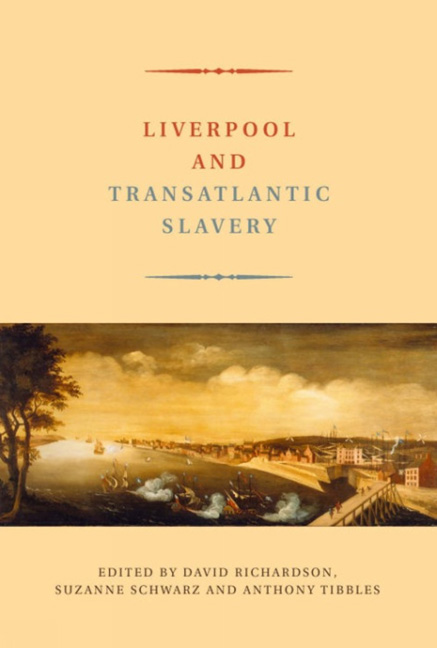Book contents
- Frontmatter
- Content
- Preface
- Notes on Contributors
- Introduction Liverpool, the African Slave Trade and Abolition Thirty Years On
- 1 Liverpool's Dominance in the British Slave Trade, 1740–1807
- 2 African Agency and the Liverpool Slave Trade
- 3 Human Capital in the British Slave Trade
- 4 Liverpool's Slave Trade to the Colonial Chesapeake: Slaving on the Periphery
- 5 The Liverpool Slave Trade, Lancaster and its Environs
- 6 The Atlantic Slave Trade and African Ethnicities in Seventeenth-Century Jamaica
- 7 The Wealth and Social Aspirations of Liverpool's Slave Merchants of the Second Half of the Eighteenth Century
- 8 ‘Cemented by the Blood of a Negro’? The Impact of the Slave Trade on Eighteenth-Century Liverpool
- 9 Commerce, Civilization and Christianity: The Development of the Sierra Leone Company
- 10 Abolitionism in Liverpool
- Index
Introduction Liverpool, the African Slave Trade and Abolition Thirty Years On
- Frontmatter
- Content
- Preface
- Notes on Contributors
- Introduction Liverpool, the African Slave Trade and Abolition Thirty Years On
- 1 Liverpool's Dominance in the British Slave Trade, 1740–1807
- 2 African Agency and the Liverpool Slave Trade
- 3 Human Capital in the British Slave Trade
- 4 Liverpool's Slave Trade to the Colonial Chesapeake: Slaving on the Periphery
- 5 The Liverpool Slave Trade, Lancaster and its Environs
- 6 The Atlantic Slave Trade and African Ethnicities in Seventeenth-Century Jamaica
- 7 The Wealth and Social Aspirations of Liverpool's Slave Merchants of the Second Half of the Eighteenth Century
- 8 ‘Cemented by the Blood of a Negro’? The Impact of the Slave Trade on Eighteenth-Century Liverpool
- 9 Commerce, Civilization and Christianity: The Development of the Sierra Leone Company
- 10 Abolitionism in Liverpool
- Index
Summary
The publication in 1976 of a collection of essays under the title Liverpool, the African Slave Trade, and Abolition, edited by Roger Anstey and Paul Hair, both sadly now deceased, was an important contribution to the historiography on the Atlantic slave trade and its abolition. The fact that Britain was among the leading eighteenth–century slave trading nations, with Liverpool in the vanguard, and that from the 1780s she was also in the forefront of abolitionism inevitably gave peculiar significance to the volume. But these were not the only factors to give the volume such significance. The essays it contained were also instrumental in shaping some of the most important debates on the British slave trade and its abolition over the following two decades. For example, the essay by the late Marion Johnson highlighted the role of African agency in the slave trade, an issue that has since become a major theme in the historiography on the slave trade more generally. Similarly, the one by Seymour Drescher foreshadowed his subsequent iconoclastic and highly contentious assault on theories that linked British abolitionism to the belief that the value of the West Indian slave system to Britain was in decline before 1807. Other essays in the volume were equally important in provoking continuing debates over other issues relating to the slave trade, including its profitability and the causes of shipboard slave mortality. Few collections of essays have been at the centre of historical debate on the slave trade as that so modestly edited some three decades ago by Roger Anstey and Paul Hair, themselves not inconsiderable contributors to our understanding of the slave trade and British abolition, as well as European encounters with Africa and Africans in the age of transatlantic slavery.
Historical writing is often shaped by the preoccupations of the age in which it is written. Anstey and Hair recognized that their edited collection was no exception. They noted that the upsurge of interest in the slave trade at that time derived from ‘changing global power dispositions’, a reference, among other things perhaps, to the American civil rights movement and to decolonization in Africa and the Caribbean, the former linked to the racial nature of transatlantic slavery and the latter to the consequences of the global encounters between Europeans and others after Columbus, important components of which were the Atlantic slave trade and later the Scramble for Africa.
- Type
- Chapter
- Information
- Liverpool and Transatlantic Slavery , pp. 1 - 13Publisher: Liverpool University PressPrint publication year: 2007



